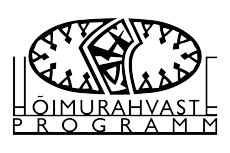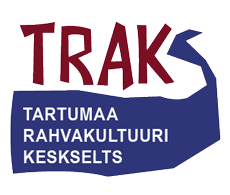Iloidaaks müö, ihmeen noored
(Forest Melody)
Mari Sarv and Leanne Barbo
Timo Kalmu
In Ingrian
Iloidaaks müö, ved oi, ihmeen noored, joo,
ihmeen nuorella, ved oi, ijällä, joo,
vihannalla, ved oi, varduvella, joo!
Kun müö vanhaksi, ved oi, tulemma, joo,
ei siid mieli, ved oi, tehnekkänä, joo,
eigä suu, ved oi, suvainnekkana, joo,
virred metsähän, ved oi, mäneväd, joo,
laulud soille, ved oi, lankeavad, joo.
Siid iloitsood, ved oi, suuret kuused, joo,
laulaad, ved oi, lahot pettäjäd, joo.
Las miä laulan, ved oi, nüd miä jouvan, joo,
nüd miä jouvan, ved oi, laulamaa, joo,
ja miä jouvan, ved oi, iloitsemaa, joo:
ei uo hellä, ved oi, heinä-aiga, joo,
eigä rukkehen, ved oi, rudinaa, joo,
eigä kaurojen, ved oi, kahinaa, joo,
viel on viigatteed, ved oi, vivussa, joo,
sirbid seisood, ved oi, seinän päällä, joo.
Lauloin ennev, ved oi, lapsembana, joo,
huuzin ennev, ved oi, hullumbana, joo.
En nüd ev, ved oi, rahoida laula, joo,
engä kullida, ved oi, kumahe, joo.
Eig ei laulella mium pittäzi, joo,
eig iloda, ved oi, enzingäähä, joo,
vaik ev voi keeltäni, ved oi, piellä, joo,
süvändäni ved oi hallikkoija joo.
Kumae, ved oi, kumea metsoi, joo,
heläe, ved oi, metsoi heleä, joo,
kumae, ved oi, kui miä kumoidan, joo,
heläe, ved oi, kui miä helöidän, joo!
Mänin metsähän miä kezoille, joo,
kesk-kezoilla miä hein-ajoilla, joo,
parahalla, ved oi, paistehella, joo,
putkehen, ved oi, punalla säällä, joo,
kaunoisäällä, ved oi, karbalohon, joo.
Olliid metsäd, ved oi, mettä täünnä, joo,
puu juuret puna-, ved oi, olutta, joo.
Ossin toobin, ved oi, ossin toizen, joo.
Hüvä oli korvessa, ved oi, kumissag, joo,
lehon alla, ved oi, lieroidellag, joo.
Jo tuli aigoi, ved oi, kottihin männäg, joo,
aigoi kirjoin, ved oi, aigoi karjoin, joo,
aigoi lapsen, ved oi, armottoman, joo.
Korvess on, ved oi, miun kottiini, joo,
matkoin on, ved oi, saarella maijaan, joo,
lindu lauloi, ved oi, ladvoissaani, joo,
miun oksillain, ved oi, orovain, joo,
kägöi kukkui, ved oi, kukkulalla, joo.
Em miä roohi, ved oi, kottihi männäg, joo,
ilman korven, ved oi, kukkaizidag, joo,
metsän meeli, ved oi, marjaizidag, joo –
jo on toodu, ved oi, toomen oksad, joo,
karsittu, ved oi, kattajan vitsad, joo,
mill mie peenoi, ved oi, pieksettihin, joo,
marjoi maahan, ved oi, kaaettihin, joo.
In English
Let’s have fun, wonderful youth,
At our wonderful young age,
At our fresh growing age!
One day we’ll be old
And will not enjoy [singing],
Or our mouths care [to sing],
The tunes will walk to the woods,
The songs will sink in the swamp.
Then the tall fir trees will be having fun,
Decayed pine trees will be singing.
Let me sing, for now I have time,
Now I have time to sing
And time to have fun:
It’s not the precious haymaking time
Or the crunching of rye
Or the hissing of oats;
The scythes are still on the crossbeam,
Sickles hanging on the wall.
I used to sing before, as a child,
I used to chant before, like crazy.
Now I won’t sing without pay
Or hum without gold.
I should not sing,
Or have fun at all,
Yet I can’t keep quiet,
Keep my heart still.
Hum, dear humming forest,
Ring, dear ringing grove,
Hum while I’m humming,
Ring, while I’m ringing!
I went to the forest in the summer,
In midsummer, haymaking time,
In the brightest sunshine,
To gather hemlocks in fine weather,
To pick cranberries on a great day.
The forests were filled with honey,
Tree roots brimming with red beer.
I bought a pint, bought another.
It was nice to hum in the deep forest,
Sing under tree leaves.
It was time to go home,
Time for the spotted cow, time for the herd,
Time for the orphan.
My home is in the deep forest,
My hut is on a distant island,
A bird was singing in the treetops,
A squirrel sitting on the branch,
A cuckoo bird calling from the hillock.
I do not dare to return home
Without woodland flowers,
Without fine forest berries—
They’ve already brought bird cherry twigs,
Cut juniper branches,
With these they beat me, poor one,
Broke me, poor berry.
The songs sung in the forest are about singing and about the forest, which is a good place to stay and sing. We sing while we are young and until the busy haymaking time, because then we’ll have no time to go to the forest.
Once we are old, our tunes will go to the forest and the trees will sing instead of us.
Once I used to sing like crazy, but now I’m only singing when I’m paid, and I no longer sing for nothing. Still, it is impossible to remain quiet in the forest humming with sounds.
The forest is beautiful and full of resources. It is good to sing here, the forest is like home. When it’s time to return home, all the berries must be picked, or there will be retributions.
The Ingrian forest melody is special for its long melody line and the rhythmic freedom, resembling a lament. The melody is improvisational, refraine words have been added inside the verse line and at the end of it and the song is sung with an extended end note to make the forest echo. The forest song has been sung alone, but also by a group while working. The singing often started with describing the forest or addressing the forest—people communicated with the forest as a human being. The following verses varied, most often the singing was about singing and being on the move. Ingrians visited the forest a lot. People not only picked berries and mushrooms for their family and animals, but also sold these in St. Petersburg. Paths from one village to another went through forests and they were much used during working and holidays.
T Koprina (J. Kouhia, P. Putkonen 1894, SKVR IV2 2578).
T M Palaga Jefimi tütar Semeo naine, 45 a, Vepsä (Armas Launis 1906, SKSÄ A 301/31a, ph 75a).
T Okuliina Nikkana tütar Sergei naine, 53 a, Vepsä (Armas Launis 1906, SKSÄ A 301/17a, ph 61 a).
T Kupsa Oute, Vepsä (Axel August Borenius 1877, SKVR IV2 1809).





